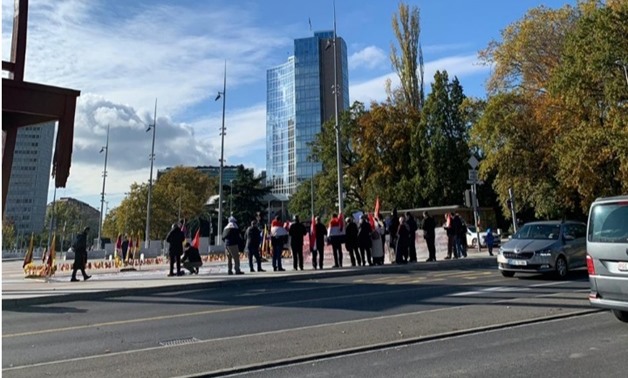
Roughly 10 Muslim Brotherhood members accepted the invitations to protest, the majority of which were not even Egyptian nationals.
CAIRO – 13 November 2019: An attempt by the terrorist Muslim Brotherhood to mobilize for a demonstration at the UN Human Rights Council in Geneva on Wednesday to distort Egypt’s successful participation and review session at the 34th session of the council has failed.
The UNHRC 34th session has firmly focused on reviewing the human rights records of three countries, namely Egypt, Iraq and Iran.
The Egyptian delegation has focused on the significant progress achieved in economic, social and health rights, which Egypt has been prioritizing over political and civil rights.
Earlier, the Muslim Brotherhood has been pressuring its members and sympathizers in Europe to take part in the so-called demonstrations, however, disagreements and dissents within the group have affected response to the calls.
Roughly 10 Muslim Brotherhood members accepted the invitations to protest, the majority of which were not even Egyptian nationals.
.jpg)
.jpg)
Egypt voluntarily submitted a mid-term report a year ago covering its efforts to meet its international commitments on human rights and the 300 recommendations it received in its second UPR in 2014.
Egypt voluntarily submitted a mid-term report a year ago covering its efforts to meet its international commitments on human rights and the 300 recommendations it received in its second UPR in 2014.
Journalists at the scene said the small group of the Muslim Brotherhood demonstrators refused journalists to broadcast their protest and even attempted to assault a journalist.
Pictures and footage shots show a very small group of Muslim Brotherhood members who gathered before the UN building and then started to leave one by one following disagreements between them.
The half-an-hour so-called protest only exposed how weak the terrorist organization and its influence has become in comparison to the significant and consecutive successes that are being achieved by the Egyptian government.

The Egyptian delegation to Geneva is headed by Minister of Parliamentary Affairs Omar Marwan and includes Assistant Foreign Minister for Human Rights Ahmed Ihab Gamaleddin, Egypt’s Permanent Representative to the UN Alaa Youssef, the head of Egypt’s National Human Rights Council (NHRC) Mohamed Fayek, the chair of the National Council for People with Disabilities Ashraf Marei, head of the National Council for Women Maya Morsi and the Director of the General Prosecution’s Human Rights Department Hani Georgy.
The Egyptian government’s report to the UNHRC’s UPR (UPR) says that of the 300 recommendations received in 2014 Egypt accepted 224 in full and 23 in part. It rejected another 23 on the grounds that they conflict with the Egyptian constitution or universally accepted concepts of human rights.

.jpg)
.jpg)

Comments
Leave a Comment